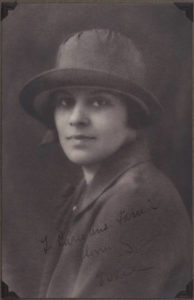
Eslanda Robeson
Eslanda Goode Robeson was born on this date in 1896. She was a Black writer and activist.
From a middle-class family in Washington D.C., her maternal grandfather was Francis L. Cardozo, a noted Black congressman from South Carolina. During the early 1900s, the family moved to New York City, where Goode finished high school and attended Columbia University, where she received a degree in chemistry in 1923. Soon after, she attended the London School of Economics and earned a doctorate in anthropology from Hartford Seminary.
While at Columbia, Goode married Paul Robeson and had one son. Paul Jr., Ms. Robeson’s main political activity from the 1930s to the 1960s, was focused on the colonized people of the world, primarily African Americans.
In 1936, while in Africa with her son, she wrote "African Journey," a trip diary. A pioneer for African self-determination, in 1941, Robeson co-founded the Council on African Affairs. In 1951, she was one of the three protesters who disrupted the United Nations postwar conference on genocide. In 1958, as one of the few women delegates, Robeson attended the All-African Peoples Conference in the newly independent Ghana. Though never an open member of the Communist Party, she was a well-wisher to Socialist countries like the Soviet Union and China after its 1949 revolution.
Called before the House Un-American Activities Committee (HUAC) in 1953 to defend her political affiliations, she refused to cooperate with what she viewed as anti-communist hysteria and was chastised. After living abroad with her husband, Robeson returned to America as the Vietnam conflict broke out. She spoke out against the involvement and for the peace movement of the 1960s. Eslanda Robeson died of cancer in 1965.
The African American Desk Reference
Schomburg Center for Research in Black Culture
Copyright 1999 The Stonesong Press Inc. and
The New York Public Library, John Wiley & Sons, Inc. Pub.
ISBN 0-471-23924-0